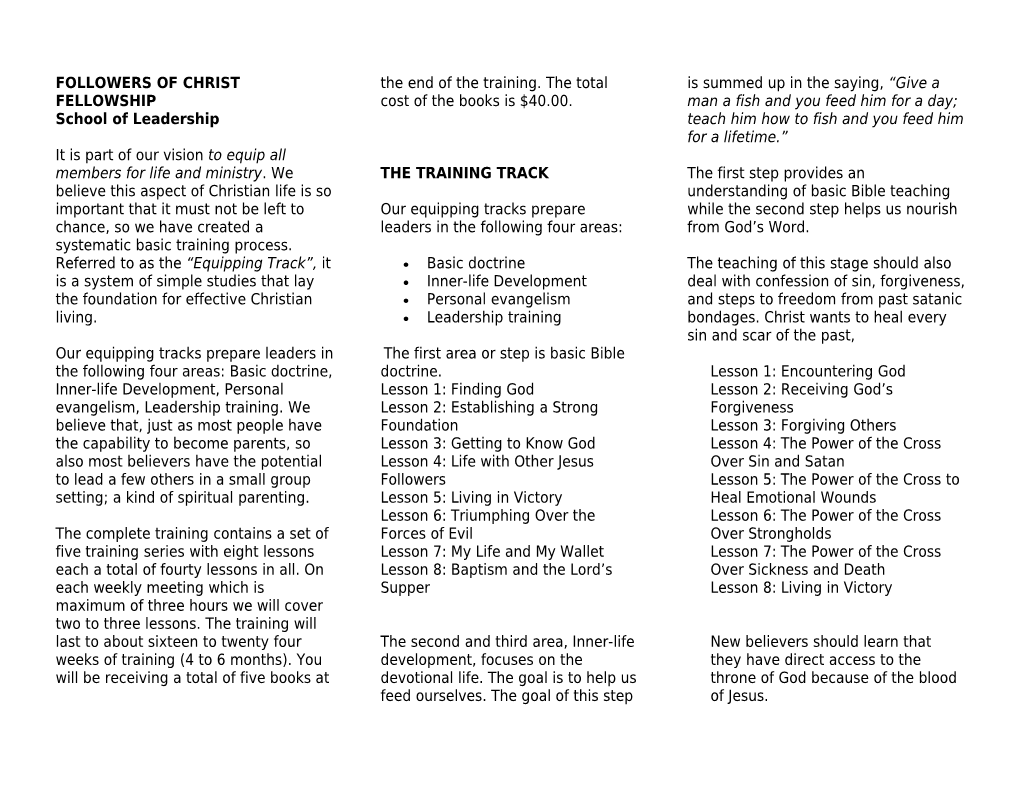FOLLOWERS OF CHRIST FELLOWSHIP
School of Leadership
It is part of our vision to equip all members for life and ministry. We believe this aspect of Christian life is so important that it must not be left to chance, so we have created a systematic basic training process. Referred to as the “Equipping Track”, it is a system of simple studies that lay the foundation for effective Christian living.
Our equipping tracks prepare leaders in the following four areas: Basic doctrine, Inner-life Development, Personal evangelism, Leadership training. We believe that, just as most people have the capability to become parents, so also most believers have the potential to lead a few others in a small group setting; a kind of spiritual parenting.
The complete training contains a set of five training series with eight lessons each a total of fourty lessons in all. On each weekly meeting which is maximum of three hours we will cover two to three lessons. The training will last to about sixteen to twenty four weeks of training (4 to 6 months). You will be receiving a total of five books at the end of the training. The total cost of the books is $40.00.
THE TRAINING TRACK
Our equipping tracks prepare leaders in the following four areas:
- Basic doctrine
- Inner-life Development
- Personal evangelism
- Leadership training
The first area or step is basic Bible doctrine.
Lesson 1: Finding God
Lesson 2: Establishing a Strong Foundation
Lesson 3: Getting to Know God
Lesson 4: Life with Other Jesus Followers
Lesson 5: Living in Victory
Lesson 6: Triumphing Over the Forces of Evil
Lesson 7: My Life and My Wallet
Lesson 8: Baptism and the Lord’s Supper
The second and third area, Inner-life development, focuses on the devotional life. The goal is to help us feed ourselves. The goal of this step is summed up in the saying, “Give a man a fish and you feed him for a day; teach him how to fish and you feed him for a lifetime.”
The first step provides an understanding of basic Bible teaching while the second step helps us nourish from God’s Word.
The teaching of this stage should also deal with confession of sin, forgiveness, and steps to freedom from past satanic bondages. Christ wants to heal every sin and scar of the past,
Lesson 1: Encountering God
Lesson 2: Receiving God’s Forgiveness
Lesson 3: Forgiving Others
Lesson 4: The Power of the Cross Over Sin and Satan
Lesson 5: The Power of the Cross to Heal Emotional Wounds
Lesson 6: The Power of the Cross Over Strongholds
Lesson 7: The Power of the Cross Over Sickness and Death
Lesson 8: Living in Victory
New believers should learn that they have direct access to the throne of God because of the blood of Jesus.
Lesson 1: Connecting with God
Lesson 2: Preparing to Meet God
Lesson 3: Making Contact with God
Lesson 4: Receiving from God
Lesson 5: Entering God’s Presence
Lesson 6: Praying to God
Lesson 7: Growing in Spiritual Power
Lesson 8: Resting and Reflecting
The fourth area, Personal Evangelism, teaches the person how to share his or her faith (e.g., four spiritual laws, Romans Road, E.E. outline, etc.). Each believer needs to learn how to lead someone to Jesus Christ.
This stage teaches the plan of salvation in a systematic, step-by-step process. Beyond learning the content of the gospel presentation, the person must also learn how to develop friendships with non-Christians (i.e., reaching their close contacts-oikos). The effectiveness of small group evangelism is also highlighted and teaching is given on how the cell functions like a team to evangelize non-Christians as well as providing the ideal atmosphere for non-believers.
Lesson 1: Sharing Good News
Lesson 2: Sowing the Seed/
Lesson 3: Relational Evangelism
Lesson 4: Looking for Open Doors
Lesson 5: How to Share the Message
Lesson 6: Sharing Your Journey
Lesson 7: Fishing with a Net
Lesson 8: Meeting Needs as a Group
The final area covers how to lead a cell group. The manual for this stage should cover the basics of cell ministry, small group dynamics (e.g., how to listen well, transparent sharing, etc.), how to lead a cell group, and characteristics of godly leaders.
Lesson 1: Understanding the Cell
Lesson 2: Facilitating the Group
Lesson 3: Ministering to People
Lesson 4: Creating a Spiritual Atmosphere
Lesson 5: Multiplying Cells
Lesson 6: Working Diligently
Lesson 7: Working Smart
Lesson 8: Making Disciple-makers
Want to know more?
School Of Leadership (SOL)
Ptr. Randy Casillan (204) 981-9059
FOLLOWERS OF CHRIST FELLOWSHIP
1535 Elgin. Ave. West R3E 1C1
FOLLOWERS OF CHRIST
School Of Leaders
